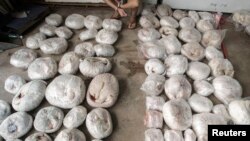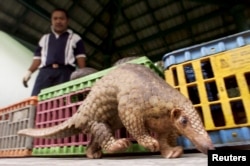Alongside dirt roads twisting through the dense tropical forests of Gabon, the scaly bodies of lifeless long-snouted pangolins dangle from sticks stuck in the ground by hunters.
The pangolin, a mammal that looks like an anteater but has the tough scales of a crocodile, has long been prized in central Africa as a bushmeat delicacy.
But growing demand for it from Asia, where pangolin scales are used in Chinese medicine to help women lactate and to cure skin disorders, now threatens to hasten its demise and rob African countries of a precious resource.
Conservationists say the demand boom is due to declining wild populations in Asia as well as high numbers of Chinese workers in Africa's resource and timber sectors, located in remote regions of the continent's interior.
The example of Africa's elephants, whose numbers have been slashed by demand from Asia for their ivory, have prompted conservations to mobilise to protect the pangolins.
"It's always been ivory but the new pressure is on the pangolin," said Lee White, the British-born head of Gabon's national parks agency, which runs the 13 national parks covering just over a tenth of the country's territory.
"We're looking out for workers here putting out orders for pangolin and we've had to train sniffer dogs at the ports."
Exports Boom
Shy and near-sighted, pangolins only venture out from the safety of their burrows or treetop homes at night to scour for insects. When startled, they curl up into a ball - a technique that is futile against the cable snares set by local trackers.
All eight of the world's species of pangolin, which range from 30 to 100 cm (12 to 39 in.) in length, are threatened with extinction.
Up until recently, African exports were thought to be done opportunistically and on a small scale. One parcel of scales was found nestled inside a tin of dog biscuits.
But so far this year, more than six tons of African pangolin scales have been seized before export to Asia - more than the combined total of all previous seizures.
Cameroon seized 1.5 tons at Yaounde airport in June, according to senior customs department official Etienne Tabi Mbang. Other shipments were intercepted from Kenya, Sierra Leone and South Africa.
"There is potential for it to become more industrial as people realize they can make money from pangolin scales, and we are starting to see this already with seizures of large volumes of scales," said Dan Challender, who is doing his PhD research at the University of Kent in England on the pangolin trade and co-chairs a pangolin specialist group.
Within Asia, around 10,000 animals are seized annually despite a defacto trade ban, but Challender says this could represent just 10 to 20 percent of the total trade.
Popular Dish
Following the arrest of a dozen Chinese workers with pangolin scales last year, Gabon is working with researchers on an investigation into the growing exports.
Francesca Baker, a post-graduate student at Imperial College London who is heading a Gabon research group, says villagers admit to selling carcasses to Asian workers.
One such worker approached a local bushmeat processor and sought to strike a deal to purchase the scales.
Neighboring Cameroon has also organized workshops for customs officials at air and sea ports to identify and seize pangolin shipments.
But while conservationists praise the work of some African governments, they say tougher local legislation is required to protect them. Gabon has three pangolin species but only one, the giant pangolin, is protected from hunters. Even so, it is still served in local restaurants.
"Despite Gabon being one of the better students in terms of protecting the environment, the penalties for infringements are far from being dissuasive," said Eric Arnhem of the Wildlife Conservation Society of Gabon.
In the seaside capital Libreville, pangolin meat is popular with the local elite. The meat is boiled for hours to remove the scales in restaurants in the chic Montee de Louis district and then dished out with cassava or banana for up to XAF 10,000 ($19.74) a plate, expensive compared with other dishes.
"The pangolin is in great demand from our clients although it's rare to see it in the market," said Madeleine Sah, owner of one of the restaurants. "But when we have it, it is sold straight away."
(1 US dollar = 506.61 Central African CFA franc BEAC)






